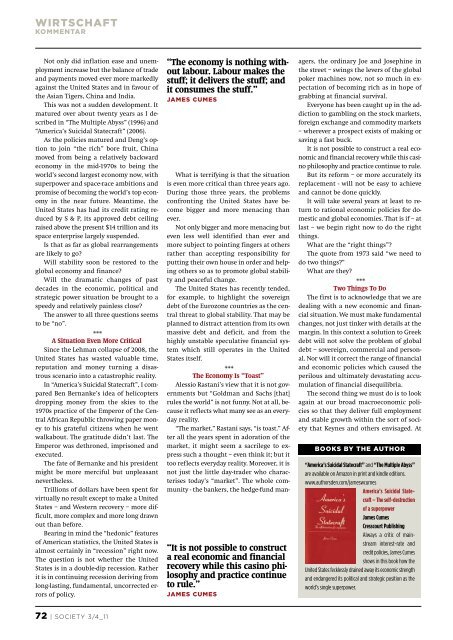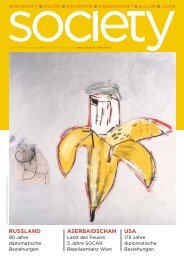Society 359 / 2011
Erfolgreiche ePaper selbst erstellen
Machen Sie aus Ihren PDF Publikationen ein blätterbares Flipbook mit unserer einzigartigen Google optimierten e-Paper Software.
WIRTSCHAFT<br />
KOMMENTAR<br />
Not only did inflation ease and unemployment<br />
increase but the balance of trade<br />
and payments moved ever more markedly<br />
against the United States and in favour of<br />
the Asian Tigers, China and India.<br />
This was not a sudden development. It<br />
matured over about twenty years as I described<br />
in “The Multiple Abyss” (1996) and<br />
“America’s Suicidal Statecraft” (2006).<br />
As the policies matured and Deng’s option<br />
to join “the rich” bore fruit, China<br />
moved from being a relatively backward<br />
economy in the mid-1970s to being the<br />
world’s second largest economy now, with<br />
superpower and space-race ambitions and<br />
promise of becoming the world’s top economy<br />
in the near future. Meantime, the<br />
United States has had its credit rating reduced<br />
by S & P, its approved debt ceiling<br />
raised above the present $14 trillion and its<br />
space enterprise largely suspended.<br />
Is that as far as global rearrangements<br />
are likely to go?<br />
Will stability soon be restored to the<br />
global economy and finance?<br />
Will the dramatic changes of past<br />
decades in the economic, political and<br />
strategic power situation be brought to a<br />
speedy and relatively painless close?<br />
The answer to all three questions seems<br />
to be “no”.<br />
***<br />
A Situation Even More Critical<br />
Since the Lehman collapse of 2008, the<br />
United States has wasted valuable time,<br />
reputation and money turning a disastrous<br />
scenario into a catastrophic reality.<br />
In “America’s Suicidal Statecraft”, I compared<br />
Ben Bernanke’s idea of helicopters<br />
dropping money from the skies to the<br />
1970s practice of the Emperor of the Central<br />
African Republic throwing paper money<br />
to his grateful citizens when he went<br />
walkabout. The gratitude didn’t last. The<br />
Emperor was dethroned, imprisoned and<br />
executed.<br />
The fate of Bernanke and his president<br />
might be more merciful but unpleasant<br />
nevertheless.<br />
Trillions of dollars have been spent for<br />
virtually no result except to make a United<br />
States – and Western recovery – more difficult,<br />
more complex and more long drawn<br />
out than before.<br />
Bearing in mind the “hedonic” features<br />
of American statistics, the United States is<br />
almost certainly in “recession” right now.<br />
The question is not whether the United<br />
States is in a double-dip recession. Rather<br />
it is in continuing recession deriving from<br />
long-lasting, fundamental, uncorrected errors<br />
of policy.<br />
“The economy is nothing without<br />
labour. Labour makes the<br />
stuff; it delivers the stuff; and<br />
it consumes the stuff.”<br />
JAMES CUMES<br />
“It is not possible to construct<br />
a real economic and financial<br />
recovery while this casino philosophy<br />
and practice continue<br />
to rule.”<br />
JAMES CUMES<br />
What is terrifying is that the situation<br />
is even more critical than three years ago.<br />
During those three years, the problems<br />
confronting the United States have become<br />
bigger and more menacing than<br />
ever.<br />
Not only bigger and more menacing but<br />
even less well identified than ever and<br />
more subject to pointing fingers at others<br />
rather than accepting responsibility for<br />
putting their own house in order and helping<br />
others so as to promote global stability<br />
and peaceful change.<br />
The United States has recently tended,<br />
for example, to highlight the sovereign<br />
debt of the Eurozone countries as the central<br />
threat to global stability. That may be<br />
planned to distract attention from its own<br />
massive debt and deficit, and from the<br />
highly unstable speculative financial system<br />
which still operates in the United<br />
States itself.<br />
***<br />
The Economy Is “Toast”<br />
Alessio Rastani’s view that it is not governments<br />
but “Goldman and Sachs [that]<br />
rules the world” is not funny. Not at all, because<br />
it reflects what many see as an everyday<br />
reality.<br />
“The market,” Rastani says, “is toast.” After<br />
all the years spent in adoration of the<br />
market, it might seem a sacrilege to express<br />
such a thought – even think it; but it<br />
too reflects everyday reality. Moreover, it is<br />
not just the little day-trader who characterises<br />
today’s “market”. The whole community<br />
- the bankers, the hedge-fund managers,<br />
the ordinary Joe and Josephine in<br />
the street – swings the levers of the global<br />
poker machines now, not so much in expectation<br />
of becoming rich as in hope of<br />
grabbing at financial survival.<br />
Everyone has been caught up in the addiction<br />
to gambling on the stock markets,<br />
foreign exchange and commodity markets<br />
– wherever a prospect exists of making or<br />
saving a fast buck.<br />
It is not possible to construct a real economic<br />
and financial recovery while this casino<br />
philosophy and practice continue to rule.<br />
But its reform – or more accurately its<br />
replacement - will not be easy to achieve<br />
and cannot be done quickly.<br />
It will take several years at least to return<br />
to rational economic policies for domestic<br />
and global economies. That is if – at<br />
last – we begin right now to do the right<br />
things.<br />
What are the “right things”?<br />
The quote from 1973 said “we need to<br />
do two things?”<br />
What are they?<br />
***<br />
Two Things To Do<br />
The first is to acknowledge that we are<br />
dealing with a new economic and financial<br />
situation. We must make fundamental<br />
changes, not just tinker with details at the<br />
margin. In this context a solution to Greek<br />
debt will not solve the problem of global<br />
debt – sovereign, commercial and personal.<br />
Nor will it correct the range of financial<br />
and economic policies which caused the<br />
perilous and ultimately devastating accumulation<br />
of financial disequilibria.<br />
The second thing we must do is to look<br />
again at our broad macroeconomic policies<br />
so that they deliver full employment<br />
and stable growth within the sort of society<br />
that Keynes and others envisaged. At<br />
BOOKS BY THE AUTHOR<br />
“America’s Suicidal Statecraft” and “The Multiple Abyss”<br />
are available on Amazon in print and kindle editions.<br />
www.authorsden.com/jameswcumes<br />
America’s Suicidal Statecraft<br />
– The self-destruction<br />
of a superpower<br />
James Cumes<br />
Cresscourt Publishing<br />
Always a critic of mainstream<br />
interest-rate and<br />
credit policies, James Cumes<br />
shows in this book how the<br />
United States fecklessly drained away its economic strength<br />
and endangered its political and strategic position as the<br />
world’s single superpower.<br />
72 | SOCIETY 3/4_11


















